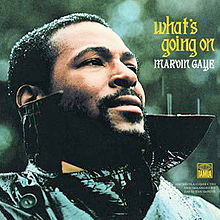Now Playing
Current DJ: BDC: The Shape of Things to Come
The Wedding Present Science Fiction from 24 Songs (HHBTM/Clue) Add to Collection
Requests? 773-DJ-SONGS or .(JavaScript must be enabled to view this email address)
by Josh Friedberg
 I don’t know I’ve ever been so wrong about an album in my life.
I don’t know I’ve ever been so wrong about an album in my life.
When I was younger, there were a lot of albums I called “overrated” after one casual listen because I didn’t understand the hype around them. It’s true, as I thought in the early 2000s, that Marvin Gaye’s 1971 soul masterpiece, What’s Going On, is a sacred cow, often treated with such reverence as if it is immune to criticism. It shouldn’t be, but perhaps it needs to be put in a fuller social context (the Vietnam War, African American freedom struggles, environmental degradation, youth movements, etc.) to be most appreciated.
That said, Smokey Robinson was right when he said around 2000 that the album makes more sense today than it did when it was released—deindustrialization and the growth of the prison-industrial complex, among other factors, have disastrously impacted communities of color in this country, and today Gaye’s opus continues to resonate amid the turmoil that spawned Black Lives Matter.
What’s Going On is also the most acclaimed album ever by an African American artist, according to statistical aggregate acclaimedmusic.net. White rock critics have loved this album since it came out, with Dave Marsh calling it the greatest black pop album ever, though African American critics have also lauded this album. For example, Cornel West called it something like the greatest musical achievement created by an African American.
So one could be forgiven for having unusually high expectations for such an album. When I first heard the album on CD, I was very familiar with the title track, widely hailed as one of the greatest songs ever recorded, but I was unprepared to deal with an album that was conceived as an album, rather than a collection of songs. There are some relative fragments on What’s Going On that don’t stand out like the singles do, and I was merciless in my response. At one point in the first half of the 2000s, I guested on a music talk show talking about overrated albums, calling out What’s Going On for inconsistency—as if consistency of quality across tracks should be the goal of every album.
Needless to say, I was wrong. Listening to the album today, I can appreciate the lush orchestrations, the layered dialogue between multiple vocal tracks, the socially conscious lyrics, and the spirituality of What’s Going On. The song that knocked me on my ass when I first heard the album was the concluding track, “Inner City Blues,” full of both appealing musical elements (dark piano, spare congas, and a haunting closing section) and utter desperation (“Make me wanna holler, the way they do my life/ This ain’t livin’”). Today, it still knocks me on my ass, but I have a greater appreciation of its message after studying some history surrounding the album’s creation.
Elsewhere, the album is also stunning: even the shorter tracks like “What’s Happening Brother” and “God Is Love” soar with Gaye’s passionate cries and falsetto whoops. The album may still be best known for the opening track, but it deserves many listens, detached from the hype or not. Smokey Robinson also called this the most profound album released in his lifetime, and there’s a legitimate case to be made for that.
What I suggest, however, for novices is to listen for the flow of the album as a whole, rather than for individual songs. In the age of hearing songs individually on iTunes and streaming services, that may be difficult for some to comprehend, but for a larger artistic vision of an album, Gaye was an ideal artist for this type of project. Motown Records founder Berry Gordy, Jr. initially hated the album, but it has far outlasted many of Motown’s other significant musical accomplishments.
And for a white boy from the suburbs like me, listening to the album as a whole and learning about the history surrounding it is what made me appreciate this album so much more.
Next entry: 2017 Pitchfork Music Festival: Day 2
Previous entry: @CHIRPRadio (Week of July 17)